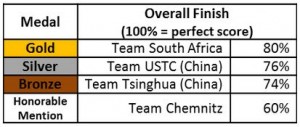 While I had posted detailed results of the ISC’14 Summer Cluster Slam (here and here), I neglected to put out the final standings and analysis. This makes me an idiot. (Well, not only this; there are a lot of other things that contribute to that assessment as well.)
While I had posted detailed results of the ISC’14 Summer Cluster Slam (here and here), I neglected to put out the final standings and analysis. This makes me an idiot. (Well, not only this; there are a lot of other things that contribute to that assessment as well.)
First, the big surprise: Team South Africa took the Overall Championship Gold Medal for the second consecutive time. Last year, the plucky South Africans were a first-time competitor, which usually means a middle-of-the-pack finish.
In addition to being the first team from South Africa, they didn’t really know each other. The team was formed from three different schools that had sent students to compete at the first annual CHPC regional cluster competition.
That 2013 South African team came out of nowhere to narrowly defeat the rest of the field at ISC’13, which sent shockwaves through the student cluster competition world.
But even with the 2013 trophy under their belt, very few expected them to repeat at the 2014 ISC competition. (Well, I did … but that’s because I was fortunate enough to witness the 2013 edition of their regional competition. More on that later.)
Yet Team South Africa once again topped the field and takes home the Overall Championship trophy. Not only did they score the first repeat win in the ISC competition; they did it with an entirely new team of students.
The second- and third-place finishers were also big surprises to me and most other competition observers.
Team USTC (University of Science and Technology of China) was a first-time competitor and, as such, not expected to make many waves at ISC’14. But make waves they did.
Sponsored by Chinese server vendor Sugon, Team USTC parlayed a 100 per cent score on HPCC and a field-leading 90 per cent score on the interview into a solid second-place finish. A better score on the “secret mission” task, and we’d be crowning them the winner of the Overall Championship. This is definitely a team to watch in future cluster competitions.
The third-place finisher, China’s Team Tsinghua, is a very familiar team to student cluster competition fans. Together with long-term sponsor Inspur, Tsinghua University has participated in five previous competitions, taking home two overall championships plus a LINPACK prize. Their experience and skills make them a team to be reckoned with in any cluster competition, and usually a favorite – except at ISC’14.
Why? Their hardware configuration. Team Tsinghua went with an old-school traditional cluster. No Phi co-processors, no NVIDIA Teslas, no accelerators at all. And their configuration, which included 10 nodes, 240 CPU cores, and 1.28TB of memory, wasn’t even the largest cluster in the field.
Most observers, myself included, figured this would put them out of the running. They simply wouldn’t have enough horsepower to run with the big dogs. But run with the big dogs they did. (Second Yoda-like sentence in this story, if anyone is keeping track.)
In our conversations, it was clear that Team Tsinghua knew what they were up against. They knew they couldn’t hang with the other teams, who were running accelerated gear, when it came to HPCC and HPL.
This left them with only one option: they had to ace the scientific application portions of the competition. It was their only chance to add another cluster crown to their trophy case back home.
They almost pulled it off. A 99 per cent score on GADGET-3, a second-place finish on the secret mission task, plus a strong score on Quantum ESPRESSO put them in the running. They were also one of only two teams to turn in a valid result for every application and task. (South Africa was the other).
Unfortunately, Team Tsinghua came up a little short. Their dreams of an amazing come-from-behind victory were dashed. But they did snare a third-place finish, which was an outstanding result when you consider what they were going up against.
Honorable mentions & fan favorites
Team Chemnitz gets an honorable mention for finishing fourth out of the field of 11, and for showing a massive improvement over their 2013 scores. They also grabbed the Fan Favorite award this year.
A constant stream of visitors circulated around their corner booth, which — coupled with their good humor and willingness to engage with the crowd — gave them a lot of late-breaking votes in the Fan Favorite competition.
Team Hamburg and Team Edinburgh were also show favorites. Both teams were very outgoing and approachable, which goes a long way with show-goers.
So what have we learned?
Here’s a nicely organized list of quick takeaways:
Dynasty isn’t just an old TV show: South Africa’s CHPC might be on their way to building a Student Cluster Competition dynasty that could rival both American dynasties (The University of Texas at Austin) and the Chinese (Tsinghua, NUDT, Ming). From what I’ve observed, the South Africans may have broken to code on taking inexperienced students and turning them into HPC dynamos. I’m going to do some in-depth reporting on the “South African Way” in upcoming articles.
Experience isn’t king when it comes to student clustering: This was the first competition for second-place finisher Team USTC. In fact, two of the three winning teams in past ISC cluster competitions were first-time competitors. And our most recent winner, Team South Africa, was composed of students who were entirely new to the team and the high-pressure world of big-time student clustering.
It’s the meat-ware, not the hardware: A close look at results from past cluster competitions reveals that the teams with the latest and greatest hardware, or the most hardware, typically aren’t the big winners. Time and time again, we see that the winning edge comes from the way the students tune their systems to more efficiently run the applications.
Even more important is how the team responds to the inevitable glitches, breakdowns, and mis-configurations that always occur. If the team doesn’t panic, if they pull together and think their way through the problem, they’ll typically be fine. Just like in the movies.
Next up is our exhaustive coverage of the SC14 student cluster competition. Stay tuned…
Posted In: Latest News, ISC 2014 Leipzig
Tagged: supercomputing, Student Cluster Competition, HPC, University of Science and Technology of China, USTC, Tsinghua University, Chemnitz University of Technology, Centre for High Performance Computing, CHPC, ISC 2014, Results

